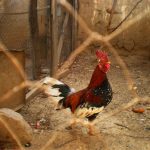Keeping chickens in close proximity to one’s residence offers numerous advantages for households. The primary benefit is the availability of fresh, organic eggs, free from synthetic chemicals and antibiotics commonly found in commercially produced eggs. Chickens also contribute to waste reduction by consuming kitchen scraps, which they convert into nutrient-rich fertilizer for gardens.
This process not only reduces household expenses on fertilizers but also minimizes waste sent to landfills. Raising chickens promotes self-sufficiency and sustainability by allowing individuals to control their food production and decrease dependence on commercial food sources. This can be particularly valuable during periods of food scarcity or economic uncertainty.
Additionally, chickens serve as natural pest control in gardens, consuming insects and other organisms that may damage plants. The practice of keeping chickens near one’s home fosters a stronger connection to food sources, encourages waste reduction, and supports a more sustainable lifestyle. It combines practical benefits with environmental consciousness, making it an increasingly popular choice for those seeking to enhance their household’s self-reliance and ecological footprint.
Table of Contents
- 1 Creating a Safe and Comfortable Environment for Your Chickens
- 2 Tips for Free Range Chicken Keeping
- 3 Integrating Chickens into Your Daily Routine
- 4 Managing Waste and Odor
- 5 Protecting Your Garden and Landscaping
- 6 Ensuring the Health and Safety of Your Chickens
- 7 FAQs
- 7.1 What does it mean to keep chickens close to your house cage-free?
- 7.2 What are the benefits of keeping chickens close to your house cage-free?
- 7.3 What should be considered when keeping chickens close to your house cage-free?
- 7.4 What are some tips for keeping chickens close to your house cage-free?
- 7.5 Are there any potential drawbacks to keeping chickens close to your house cage-free?
Key Takeaways
- Keeping chickens close to your house provides easy access for care and monitoring
- Creating a safe and comfortable environment for your chickens ensures their well-being and productivity
- Free range chicken keeping allows chickens to exhibit natural behaviors and reduces feed costs
- Integrating chickens into your daily routine can be beneficial for both the chickens and the owner
- Proper waste management and odor control are essential for a healthy and pleasant environment for both chickens and humans
- Protecting your garden and landscaping from chickens can be achieved through proper fencing and designated areas
- Ensuring the health and safety of your chickens requires regular health checks and predator-proofing measures
Creating a Safe and Comfortable Environment for Your Chickens
The Importance of a Secure Coop
When keeping chickens close to your house, it is essential to provide a secure coop that protects them from predators and the elements. The coop should be well-ventilated, insulated, and have enough space for the chickens to roost and lay eggs comfortably.
Equipping the Coop for Comfort
Additionally, the coop should be equipped with nesting boxes, perches, and a clean bedding material to ensure the chickens have a comfortable place to rest and lay eggs.
Providing a Spacious Outdoor Area
In addition to the coop, it is important to provide a spacious outdoor area for the chickens to roam and forage. This can be achieved by setting up a chicken run or allowing the chickens to free range in a fenced-in area. The outdoor area should have access to fresh water, shade, and protection from extreme weather conditions.
Ensuring Well-being and Productivity
Providing a safe and comfortable environment for your chickens is essential for their well-being and productivity.
Tips for Free Range Chicken Keeping

Free range chicken keeping can provide numerous benefits for both the chickens and the environment. When allowing chickens to free range, it is important to provide a large, secure outdoor area for them to roam and forage. This can be achieved by setting up a fenced-in area with access to fresh water, shade, and protection from predators.
Additionally, it is important to monitor the chickens regularly to ensure they are safe and healthy while free ranging. Furthermore, free range chickens should be provided with a balanced diet to supplement their foraging. This can include providing them with access to supplemental feed, such as grains and protein sources, to ensure they are receiving all the necessary nutrients.
Additionally, it is important to rotate the free range area regularly to prevent overgrazing and allow the land to recover. By following these tips for free range chicken keeping, you can ensure that your chickens have a healthy and fulfilling outdoor experience.
Integrating Chickens into Your Daily Routine
Integrating chickens into your daily routine can be a rewarding experience that provides numerous benefits for both you and the chickens. One way to integrate chickens into your daily routine is by establishing a feeding and egg collection schedule. By feeding the chickens at the same time each day, you can establish a routine that helps keep the chickens healthy and productive.
Additionally, collecting eggs daily can help ensure that they are fresh and reduce the risk of them being damaged or stolen by predators. Another way to integrate chickens into your daily routine is by spending time with them and observing their behavior. Chickens are social animals that enjoy human interaction, so spending time with them can be a rewarding experience for both you and the chickens.
Additionally, observing their behavior can help you identify any potential health or behavioral issues early on. By integrating chickens into your daily routine, you can develop a deeper connection with your flock and ensure their well-being.
Managing Waste and Odor
Managing waste and odor is an important aspect of keeping chickens close to your house. One way to manage waste is by setting up a composting system for chicken manure and bedding material. This can help turn waste into nutrient-rich fertilizer for your garden while reducing the amount of waste that ends up in landfills.
Additionally, regularly cleaning the coop and outdoor area can help reduce odor and prevent the buildup of harmful bacteria. Furthermore, using natural odor control methods, such as adding herbs or essential oils to the coop bedding, can help neutralize odors and create a more pleasant environment for both you and the chickens. Additionally, providing proper ventilation in the coop can help reduce moisture buildup and prevent the growth of odor-causing bacteria.
By effectively managing waste and odor, you can create a clean and healthy environment for your chickens and minimize any potential nuisances for yourself and your neighbors.
Protecting Your Garden and Landscaping

Setting Up Barriers
One way to protect your garden is by setting up fencing or barriers around sensitive areas to prevent the chickens from accessing them. This can help protect plants, flowers, and vegetables from being trampled or eaten by the chickens.
Redirecting Chicken Behavior
Additionally, providing alternative foraging areas or designated chicken-friendly zones can help redirect their natural behavior away from sensitive garden areas. Furthermore, using natural deterrents, such as chicken wire or netting, can help protect specific plants or areas from being damaged by the chickens.
Providing Ample Space
Providing ample space for the chickens to roam and forage in designated areas can help reduce their impact on sensitive garden areas.
Coexisting Harmoniously
By taking proactive measures to protect your garden and landscaping, you can ensure that both your chickens and your garden can coexist harmoniously.
Ensuring the Health and Safety of Your Chickens
Ensuring the health and safety of your chickens is essential when keeping them close to your house. One way to ensure their health is by providing them with a balanced diet that includes all the necessary nutrients they need to thrive. This can include providing access to fresh water, high-quality feed, and supplemental sources of protein and calcium.
Additionally, monitoring their behavior and appearance regularly can help identify any potential health issues early on. Furthermore, providing regular veterinary care and vaccinations can help prevent common diseases and ensure the long-term health of your flock. Additionally, protecting them from predators by securing the coop and outdoor area with sturdy fencing and locks can help keep them safe from harm.
By taking proactive measures to ensure the health and safety of your chickens, you can provide them with a happy and fulfilling life while reaping the benefits of keeping them close to your house.
If you’re looking for ideas on how to keep your chickens close to your house without confining them to a cage, you might want to check out this article on large chicken coop ideas from Poultry Wizard. They offer some great tips on creating a spacious and comfortable living space for your chickens while still allowing them the freedom to roam. Check it out here for some inspiration on how to create a chicken-friendly environment near your home.
FAQs
What does it mean to keep chickens close to your house cage-free?
Keeping chickens close to your house cage-free means allowing them to roam freely in a designated area near your home, rather than keeping them confined to a cage or small coop.
What are the benefits of keeping chickens close to your house cage-free?
Keeping chickens close to your house cage-free allows them to exhibit natural behaviors such as foraging, dust bathing, and socializing. It also provides easy access for egg collection and monitoring of the flock’s health.
What should be considered when keeping chickens close to your house cage-free?
When keeping chickens close to your house cage-free, it’s important to provide a secure and predator-proof area for the chickens to roam, as well as access to fresh water, shelter, and proper nutrition. Additionally, local regulations and ordinances regarding keeping chickens should be considered.
What are some tips for keeping chickens close to your house cage-free?
Some tips for keeping chickens close to your house cage-free include providing ample space for the chickens to roam, ensuring they have access to shade and shelter, and regularly monitoring their health and behavior. It’s also important to establish a routine for feeding and egg collection.
Are there any potential drawbacks to keeping chickens close to your house cage-free?
Potential drawbacks to keeping chickens close to your house cage-free include the risk of predation, the need for regular maintenance of the chicken area, and potential conflicts with neighbors. Additionally, chickens may cause damage to landscaping or gardens if not properly managed.
Meet Walter, the feathered-friend fanatic of Florida! Nestled in the sunshine state, Walter struts through life with his feathered companions, clucking his way to happiness. With a coop that’s fancier than a five-star hotel, he’s the Don Juan of the chicken world. When he’s not teaching his hens to do the cha-cha, you’ll find him in a heated debate with his prized rooster, Sir Clucks-a-Lot. Walter’s poultry passion is no yolk; he’s the sunny-side-up guy you never knew you needed in your flock of friends!







